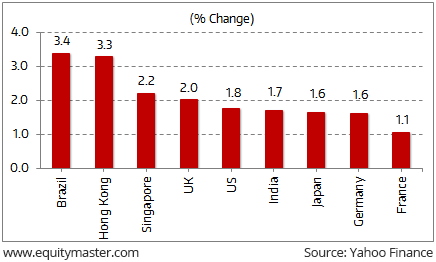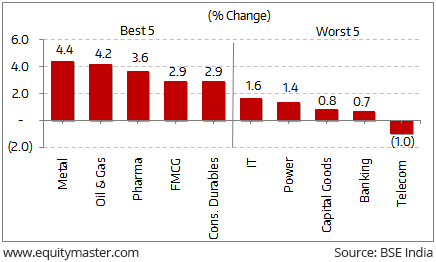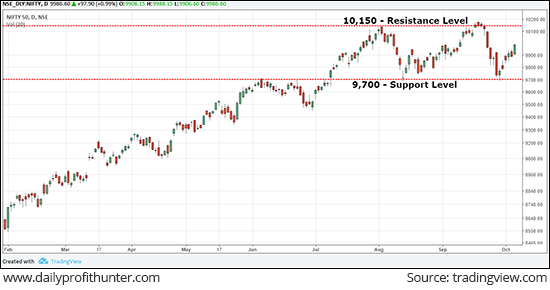- Home
- Todays Market
- Indian Stock Market News October 7, 2017
Global Markets Remain Buoyant Sat, 7 Oct RoundUp
Global financial markets ended the week on a positive note. The US markets remained resilient and were up 1.8% for the week. This was despite the fall in U.S. employment in September for the first time in seven years.
The Labor Department's closely watched jobs report showed nonfarm payrolls fell by 33,000 in September as hurricanes Harvey and Irma left displaced workers temporarily unemployed and delayed hiring. There was a record drop in employment in the leisure and hospitality sector. The decline in payrolls was the first since September 2010. But the redeeming factor is a better-than-expected rise in average wages as the annual wage growth accelerated to 2.9 percent. Even the European markets ended the week in the green.
Most of the Asian indices, barring China, have risen in the week gone by. Hong Kong was the biggest gainer up 3.3% for the week. The Japanese market scaled a fresh two-year peak and posted its fourth straight weekly gain on the back of a weaker currency.
Key World Markets During the Week

Back home, Indian share markets snapped a two-week decline and rose by 1.7% amid positive global rub-off and strong investor sentiment on increasing domestic inflows. The central bank kept interest rates unchanged amid concerns on rising inflation.
Barring telecom, all the sectoral indices have posted gains in the week gone by. Metal, oil & gas and <>pharma were the biggest gainers.
BSE Indices During the Week

Now let us discuss some key economic and industry developments during the week gone by
India's services sector activity rebounded in September after it was impacted in the previous two months, by the implementation of the goods and service tax (GST) regime in July. The country's predominant sector witnessed expansion after falling for two consecutive months, according to the Nikkei Services Purchasing Managers' Index (PMI) survey by Markit.
The Services PMI is the reading of the country's services sector output and is updated monthly. A reading above 50 indicates expansion, while any score below the mark denotes contraction.
After contracting for two consecutive months, services PMI for September finished at 50.7, signalling a steady recovery from 47.5 in August.
But RBI kept its policy rate steady at a near seven-year low of 6%, reflecting its concern that consumer inflation could accelerate further after hitting a five-month high of 3.4% in August.
In its fourth bi-monthly monetary policy statement for 2017-18, the Reserve Bank of India (RBI) kept interest rates unchanged because it anticipates upside risks to retail inflation. It also slashed its growth projections for the current fiscal and raised its inflation projections.
The central bank maintained its neutral policy stance but acknowledging sluggish economic activity, lowered its fiscal 2018 projection for gross value added, a growth metric, to 6.7% from 7.3%.
In a positive development, the government cut the excise duty on both branded and unbranded petrol and diesel by Rs 2 a litre. This would hit the revenues of the exchequer by Rs 130 billion in the second half of the current financial year at a time when the fiscal deficit has already touched 96% of the budget estimates. But consumers will get relief as the move would reduce the consumer price index (CPI)-based inflation rate by over 9 basis points.
Additionally, the GST Council lowered the tax rates on 27 products and a few services including exemption of 5% GST on import of rigs for exploration under lease. The Council also offered relief to small and medium enterprises (SMEs) and exporters by easing some of the rigours of GST compliance. Under the changed guidelines, SMEs to file GST returns quarterly and not monthly whereas the government will refund input tax credit for July and August to exporters.
Some of the key corporate developments in the week gone by
Natco Pharma's marketing partner Mylan received US drug regulator's approval for generic version of Copaxone in strengths of 40 mg/mL and 20 mg/mL. The company said that the launching plan for the above products will be communicated after concurring with its partner Mylan. The drugs are indicated for the treatment of patients with relapsing forms of multiple sclerosis (MS), a chronic inflammatory disease of the central nervous system.
The sales for the 20 mg/mL dose was approximately US$ 700 million and for the 40 mg/mL dose was approximately US$ 3.6 billion for the 12 months ending July 31, 2017, Quintiles IMS stated.
One shall note that USFDA alerts on Indian pharma companies have increased over the past few years. Regulators used to visit the plants every two years. Now they come every eight months. Increasing inspections have led to a total of 41 import alerts in the past eight years - 33 of them (80%) in just the last four years (2013-16). This clearly signifies increased USFDA scrutiny on Indian pharma firms. If that wasn't enough, increasing pricing pressure in the generics segment has dented realisations.
However, the recent development of USFDA expediting the drug approval process can bring some respite for Indian pharma companies. This comes as drug approvals for Indian companies have gone up 50% in the period from January to June 2017 compared to the same period last year.
While short-term pain is expected, companies with strong R&D capabilities and compliant plants will do well over the long term. The uncertainties make it important to be stock specific in the sector. It is important to look for companies that have the competence and staying power to overcome the challenges.
The protracted and bitter boardroom battles between promoters and the management to gain upmanship has turned the spotlight on corporate governance in India Inc. In order to tighten standards, the SEBI panel led by Uday Kotak has proposed a number of changes that include segregation of the posts of chairman and managing director and amendment of rules on independent directors, disclosures and accounting and auditing practices.
As per the 25-member committee, listed companies with more than 40% public shareholding should separate the roles of chairperson and MD or CEO from April 2020. Reportedly 12 out of the 50 companies on the benchmark Nifty have the same person occupying both posts. Additionally, the committee has also made recommendations to strengthen the role of directors and stricter rules and disclosures for related party transactions.
In news from the retail sector, Future Retail said that it will acquire HyperCity for Rs 6.5 billion. The Kishor Biyani owned company is set to acquire HyperCity, a premium chain of 19 hypermarkets from Shoppers Stop for Rs 6.5 billion through a combination of cash and shares to further consolidate his footprint in western India.
The deal, which is likely to be completed in the next three to five months, will see HyperCity Retail India Limited become a wholly-owned subsidiary of Future Retail.
Future Retail said it will allot 9.3 million shares of Rs 2 face value to HyperCity Retail's 15 shareholders at Rs 535 per share on a preferential basis.
Of the total deal value, Rs 500 crore will come from these shares. The remaining Rs 155 crore will be paid in cash. The deal is subject to approval of Shoppers Stop shareholders. The company will hold an extra-ordinary general meeting on October 13 in this regard. This is Future Retail's fifth major acquisition in the past four years and will add more than a million square feet of retail space to the company.
Wipro's digital arm has acquired the US-based design firm Cooper for an unspecified amount to expand its portfolio offerings. On acquisition, Cooper will become part of the Designit. The value of the deal will be approximately US$8.5 million.
The acquisition will strengthen Wipro Digital's design capabilities, expands its reach in North America and adds capabilities in professional design education, as its customer increasingly look at design as a differentiator for their products or services. One shall note that, Wipro acquired Designit for nearly Rs 6 billion in July 2015 to add design and digital technology capabilities.
The acquisition process is expected to be completed in the October-December quarter of the current financial year, subject to customary closing condition, the reports noted.
Mahindra & Mahindra has bagged a contract in the country's biggest tender for 10,000 electric cars after the company agreed to match the lowest bid quoted by Tata Motors.
Accordingly, the company will now be able to supply 150 eVerito sedans in the first phase of the tender while Tata Motors will supply the remaining 350 electric Tigors.
Reportedly, Tata Motors and M&M had emerged as the lowest and second lowest bidders respectively in the first phase. The PSU, a joint venture of the companies under the Ministry of Power, and the Government of India, had floated the tender to procure 10,000 electric vehicles to replace the existing fleet of petrol- and diesel-run vehicles being used by the central government and its agencies.
One shall note that, the government is pushing for a shift to electric vehicles across the country as a part of its plan to move to the cleaner fuel by 2030.
The country's largest bank, State Bank of India (SBI) will prepare a blueprint for the next three years that would include targets and benchmarks mainly related to asset quality, credit growth, digitization and human resources management.
Currently, like most of its peers, SBI's profitability is under strain because of bad loans and sluggish credit growth, and resolving both these issues remains a top priority.
At the end of June, the bank was weighed down by gross non-performing loans of Rs 1.88 trillion or almost one-tenth of its total advances. SBI is also the lead bank in a majority of the 40 cases referred for bankruptcy proceedings at the National Company Law Tribunal (NCLT).
The company expects retail loans, including those for small and medium enterprise, agriculture, will be the key drivers for growth, because demand for corporate loans remains muted.
And here's an update from our friends at Daily Profit Hunter...
The Nifty 50 Index traded on a strong note during the week. On Tuesday, it opened to 104 points gap up, but slipped lower to end the session at 71 points up. But, the bullish momentum continued as the index witnessed a rise in buying interest the next day. This was because the RBI announced its fourth bi-monthly policy keeping the key interest rate unchanged. The index traded dull on Thursday. However, it resumed the climb on the final stretch of the week, where it rose almost 100 points just shy of 10,000 mark. The Nifty ended the weekly session 2% up.
Although the index rallied during the week, looking at the broader perspective, it is stuck in a range of 9,700 - 10,150 since July. Unless we see a sustained break-out on either side of this range, the index trend remains uncertain. You can read the detailed market update here...
Nifty 50 Index Witnesses Buying Interest

For information on how to pick stocks that have the potential to deliver big returns, download our special report now!
Read the latest Market Commentary


Equitymaster requests your view! Post a comment on "Global Markets Remain Buoyant". Click here!
Comments are moderated by Equitymaster, in accordance with the Terms of Use, and may not appear
on this article until they have been reviewed and deemed appropriate for posting.
In the meantime, you may want to share this article with your friends!